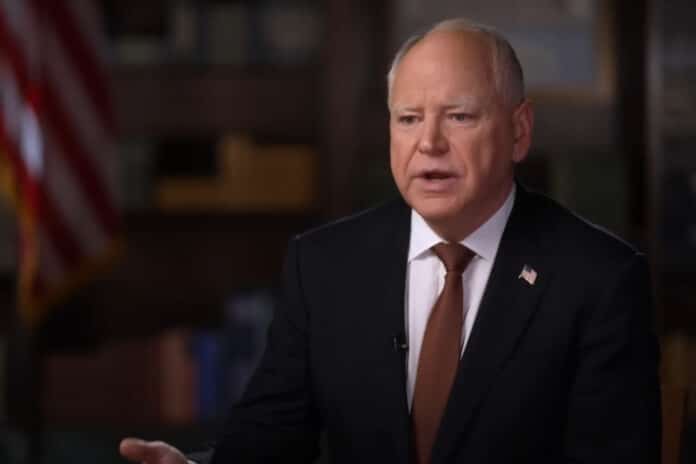
Gov. Tim Walz was swiftly corrected by Minnesota business leaders after he claimed during a “60 Minutes” interview that a paid family and medical leave program he signed into law was “promoted by the business community.”
Walz, Vice President Kamala Harris’s running mate on the Democratic ticket, said Minnesota has a “paid family and medical leave policy that was promoted by the business community.”
Tim Walz claimed on "60 Minutes" that the paid family and medical leave program he signed was "promoted by the business community." The MN Chamber of Commerce says Walz "received thousands of letters from businesses in every corner of the state, urging him to reconsider the… pic.twitter.com/sA62ohIByh
— Alpha News (@AlphaNewsMN) October 8, 2024
In fact, the 2023 bill establishing that program was opposed by the “business community and the organizations representing them,” Minnesota Chamber of Commerce CEO Doug Loon said.
“Changes were sought and positions firmly in opposition were well known. The new law is a mandate, large bureaucracy, and a new tax increase on employers and employees,” Loon wrote on social media.
His organization said Walz “received thousands of letters from businesses in every corner of the state, urging him to reconsider the one-size-fits-all mandate.”
In an excerpt from one of those letters, a business owner wrote that the program would “continue to hurt small businesses and force us out of business or out of Minnesota.”
“I can personally say that if this passes my business will cease to exist,” said another small business owner.
U.S. House Majority Whip Tom Emmer, R-Minn., also responded to Walz’s comment.
“Correction: The business community promoted AGAINST it,” Emmer wrote, noting that other business groups such as the Minnesota Business Partnership and the National Federation of Independent Business were opposed to the bill. “Add this to the list of Walz’s ‘misstatements,’ otherwise known as lies.”
The new paid leave program is set to launch in 2026. According to the Chamber of Commerce, it will require employers to “offer 12 weeks paid medical leave and 12 weeks of paid family leave (maxing out at 20 weeks total in a 52-week period).”
“It will be paid for through surplus funds and a considerable increase in payroll taxes, which can be split between employers and employees.”










